|
Sunil Khilnani
Sunil Khilnani is a professor of politics and history at Ashoka University, India. Previously, he was a professor of politics and the Director of the King's College London India Institute. He is a scholar of Indian history and politics best known as the author of '' The Idea of India'' (1997). He was the presenter of a BBC Radio 4 series entitled ''Incarnations: India in 50 Lives'', which was later published as a book in 2016. He was a 2010 Berlin Prize Fellow, and he was also a recipient of the Indian government's 2005 Pravasi Bharatiya Samman award. Career Khilnani was born in New Delhi and grew up on the continents of Africa, Europe and Asia. He earned a first at Trinity Hall, Cambridge, and a PhD at King's College, Cambridge. He was Starr Foundation Professor at the Johns Hopkins University's School of Advanced International Studies, and Director of South Asia Studies. He has also served on the Humanities and Social Sciences juries for the Infosys Prize from 2013 to 2015. P ... [...More Info...] [...Related Items...] OR: [Wikipedia] [Google] [Baidu] |
Ashoka University
Ashoka University is a philanthropy-driven private university located in the National Capital Region (NCR), India, focusing on a liberal education in the Humanities, the Social Sciences, and the Sciences. The university is on a mission to build an inclusive institution of excellence in teaching and research, to nurture responsible leaders for India and the world, and to be a pioneering force for interdisciplinary higher education. The university campus is 100 per cent accessible to meet the needs of specially-abled students. Its "philosophy of creating by giving" has been replicated by other eminent institutions. Ashoka University has enabled thousands of students to become well rounded individuals who can think critically about issues from multiple perspectives, communicate effectively and become leaders with a commitment to public service. At Ashoka, education carries a strong emphasis on foundational knowledge, thorough academic research and hands-on experience with real-wor ... [...More Info...] [...Related Items...] OR: [Wikipedia] [Google] [Baidu] |
Katherine Boo
Katherine "Kate" J. Boo (born August 12, 1964) is an American investigative journalist who has documented the lives of people in poverty. She has won the MacArthur "genius" award (2002) and the National Book Award for Nonfiction (2012), and her work earned the 2000 Pulitzer Prize for Public Service for ''The Washington Post''. She has been a staff writer for ''The New Yorker'' magazine since 2003. Her book '' Behind the Beautiful Forevers: Life, Death and Hope in a Mumbai Undercity'' won nonfiction prizes from PEN, the Los Angeles Times Book Awards, the New York Public Library, and the American Academy of Arts and Letters, in addition to the National Book Award for Nonfiction. Life Boo grew up in and near Washington, D.C., and attended the College of William and Mary for two years and transferred to Barnard and then graduated summa cum laude from Barnard College of Columbia University. She is married to Sunil Khilnani, a professor of politics and history at Ashoka University, Indi ... [...More Info...] [...Related Items...] OR: [Wikipedia] [Google] [Baidu] |
Academics Of King's College London
An academy (Attic Greek: Ἀκαδήμεια; Koine Greek Ἀκαδημία) is an institution of secondary or tertiary higher learning (and generally also research or honorary membership). The name traces back to Plato's school of philosophy, founded approximately 385 BC at Akademia, a sanctuary of Athena, the goddess of wisdom and skill, north of Athens, Greece. Etymology The word comes from the ''Academy'' in ancient Greece, which derives from the Athenian hero, ''Akademos''. Outside the city walls of Athens, the gymnasium was made famous by Plato as a center of learning. The sacred space, dedicated to the goddess of wisdom, Athena, had formerly been an olive grove, hence the expression "the groves of Academe". In these gardens, the philosopher Plato conversed with followers. Plato developed his sessions into a method of teaching philosophy and in 387 BC, established what is known today as the Old Academy. By extension, ''academia'' has come to mean the accumulation, de ... [...More Info...] [...Related Items...] OR: [Wikipedia] [Google] [Baidu] |
Academics From New Delhi
An academy (Attic Greek: Ἀκαδήμεια; Koine Greek Ἀκαδημία) is an institution of secondary or tertiary higher learning (and generally also research or honorary membership). The name traces back to Plato's school of philosophy, founded approximately 385 BC at Akademia, a sanctuary of Athena, the goddess of wisdom and skill, north of Athens, Greece. Etymology The word comes from the ''Academy'' in ancient Greece, which derives from the Athenian hero, ''Akademos''. Outside the city walls of Athens, the gymnasium was made famous by Plato as a center of learning. The sacred space, dedicated to the goddess of wisdom, Athena, had formerly been an olive grove, hence the expression "the groves of Academe". In these gardens, the philosopher Plato conversed with followers. Plato developed his sessions into a method of teaching philosophy and in 387 BC, established what is known today as the Old Academy. By extension, ''academia'' has come to mean the accumulation, dev ... [...More Info...] [...Related Items...] OR: [Wikipedia] [Google] [Baidu] |


